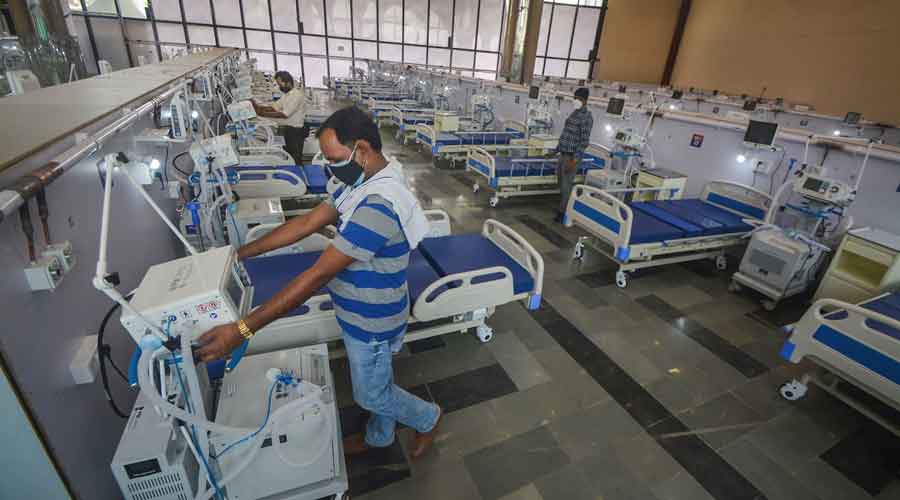
Investigative blood tests prescribed for mild cases- could provide early warnings of possible complications
They can provide early warnings of possible complications although they are not included in standard guidelines

Two key tests — one measuring C reactive protein, a biochemical marker for inflammation, and the other measuring d-dimer, a marker that signals clotting-related complications — are part of investigations recommended in standard guidelines for patients with moderate Covid-19.
The standard guidelines classify patients whose oxygen levels fall below 93 or 92 or whose respiratory rate is 24 or more breaths per minute as patients with “moderate” Covid-19 and recommend that they seek hospital care where they will be investigated for these markers.
But doctors are increasingly asking many patients to test CRP and d-dimer levels on Day 5 or Day 6 after the start of symptoms even while at home amid growing concerns that hospital beds may not be available for patients who develop moderate disease. “Not all patients with mild disease require the tests, but we do prescribe them to patients whose fever continues beyond the third day, elderly patients, or patients who have other chronic health disorders,” said Vivekanand Nadkarni, a Pune-based doctor and specialist in tropical medicine.
High CRP levels in Covid-19 patients, particularly in patients with otherwise normal blood cell counts, point to possible inflammation, while elevated d-dimer values may indicate that the patients are at an increased risk of blood clots that could lead to heart attacks or strokes.
The standard guidelines recommend that such patients receive steroids to counter the inflammation and drugs called anti-coagulants to lower the risk of clotting-related complications.
Nadkarni and other doctors say elevated levels of CRP or d-dimer taken in conjunction with the patients’ symptoms or other blood tests could help guide appropriate treatment even at home if patients are unable to find hospital beds.
“We see patients whose oxygen levels remain 92-93 or higher, but who show abnormally high levels of CRP or d-dimer,” said Aakanksha Chawla, a pulmonary medicine specialist at the Apollo Indraprastha Hospital, New Delhi. “In such patients, we prescribe oral steroids or anti-coagulants at home.”
Doctors say the goal of home-based therapy is to try and prevent patients from slipping into severe disease.
Cities and towns across India have run short of hospital beds amid the Covid-19 epidemic’s second wave that has added on average 378,000 new patients every day over the past week, and raised the counts of active patients to over 3.4 million.
Amid the shortages of hospital beds, home treatment for moderate illness is being practised on “an absolutely large scale”, Chawla told The Telegraph. “Patients are receiving oxygen, oral steroids and anti-coagulants at home.”
Doctors caution that the tests need to be done at an appropriate time — ideally on Day 5 or Day 6 after the onset of symptoms, and, if considered needed, again between Day 12 and Day 14 — and doing them too early may not help.
Nadkarni recalled a 30-year-old man who appeared to have mild symptoms and a persistent headache, but whose d-dimer levels were “very, very high” on Day 6 after the start of symptoms. He was prescribed an oral anti-coagulant at home and has since recovered.
“Are we overprescribing these tests? Probably yes,” said Nadkarni. “But they do help us identify patients who might need extra interventions such as steroids or anti-coagulants. The tests shouldn’t be done too early, or too frequently, or not at all.”
Multiple studies from China and the US during the pandemic’s early months last year had established the use of markers such as CRP and d-dimer, among others, as indicators for an increased risk of Covid-19 complications such as runaway inflammation or clots.
Covid-19 vaccination for people above 45 was suspended at the civic-run facilities of Ahmedabad on Tuesday because of unavailability of vaccines, officials said.
According to a release issued by the Ahmedabad Municipal Corporation (AMC), vaccination was also suspended for frontline and healthcare workers. The inoculation drive will resume once the AMC receives fresh vaccine stocks, the civic body said.
The state had started vaccinating people in the age group of 18 to 44 years from May 1. The AMC said this was being carried out as per schedule.



0 Response to " Investigative blood tests prescribed for mild cases- could provide early warnings of possible complications"
Post a Comment
Disclaimer Note:
The views expressed in the articles published here are solely those of the author and do not necessarily reflect the official policy, position, or perspective of Kalimpong News or KalimNews. Kalimpong News and KalimNews disclaim all liability for the published or posted articles, news, and information and assume no responsibility for the accuracy or validity of the content.
Kalimpong News is a non-profit online news platform managed by KalimNews and operated under the Kalimpong Press Club.
Comment Policy:
We encourage respectful and constructive discussions. Please ensure decency while commenting and register with your email ID to participate.
Note: only a member of this blog may post a comment.